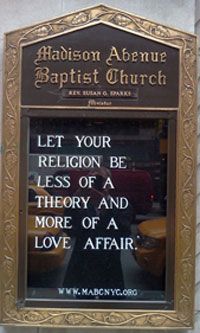This past week I was taking a walk not far from the Guideposts offices in Manhattan and came across a sign at the Madison Avenue Baptist Church that read, “Let your religion be less of a theory and more of a love affair.”
Whoa! You could write a whole book unpacking that one. But let’s think about what it might mean when we look at the topic of reading.
Do you ever catch yourself reading just to get the download on something? To grab a factoid or catch up on celebrity gossip? Have you ever read a book just to say you’ve read it?
Sometimes we do, indeed, approach the things we read hoping to prove something. We tackle a book, magazine or news article and hope to find things that bolster our point of view. Or we’re down and in search of something that affirms our misery. We use the words we read as objects to insulate us. We want to “know” them, sometimes merely to use our knowledge to brag. Images and ideas and sentiments, instead of bearing up worlds of hope, love and meaning, also can be used as hard facts, evidence to show beyond a shadow of a doubt that our version of the world is the right one.
I know an antidote to that kind of reading: Stop. Read slowly. Reread.
I sometimes find I’m pulled in so many directions—most of which are of my own doing, mind you—that I have to give myself permission to slowly read something. But when I do, I’m encountering it differently. The words reveal something new, the ideas being expressed make a deeper impression, and the reading becomes more memorable. It turns the reading into an act of devotion and love. That’s what I call spiritual reading, the kind of reading that changes you.
For my next and last entry in this little three-part series, let’s talk about encountering the Bible this way; that is, reading it not like a theory we’re trying to prove but as a love affair.






